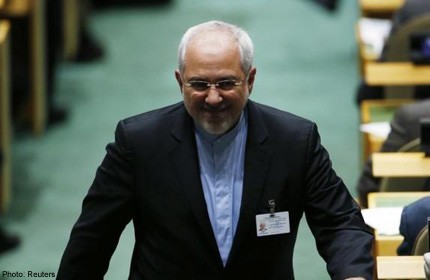Iran, US say some headway made in 'difficult' nuclear talks

VIENNA - Iran and the United States said they made some progress in high-level nuclear talks but much work remained to clinch a breakthrough deal by a late-November deadline.
Both sides said they still aimed to meet the self-imposed Nov. 24 date, despite doubts among many experts that they can reach a full agreement to end a decade-old dispute over Tehran's nuclear programme with just a few weeks remaining.
US Secretary of State John Kerry left Vienna early on Thursday after six hours of talks with Iranian Foreign Minister Mohammad Javad Zarif and European Union foreign policy chief Catherine Ashton the previous day, but his officials remained to continue the talks through Thursday.
"It was very difficult, serious and intensive ... but instead of focusing on problems, we discussed solutions as well," Zarif told Iranian media on Thursday, sources who were present told Reuters. "There was progress in all the fields."
The US side also said progress was made.
Zarif said he would next meet Kerry and Ashton in three to four weeks' time though not in Vienna, Iranian state television reported. Ashton coordinates talks with Iran on behalf of the six other countries involved, including the United States.
Ashton and Zarif met on Thursday with senior officials from the six - the United States, France, Germany, China, Russia and Britain - before the Iranian foreign minister left Vienna.
The talks are in a "critical phase", Ashton's spokesman said.
"We are trying hard to make progress and remain fully engaged to achieve a comprehensive solution" by the deadline, Michael Mann said in a statement, adding that experts would meet in coming days to continue technical work.
Relations with the West have thawed since Hassan Rouhani was elected president last year seeking to end Iran's international isolation, and the talks are aimed at easing concerns about Tehran's atomic activities in exchange for lifting sanctions.
But Western officials say there are still gaps in the positions, especially over the future scope of Iran's production of enriched uranium, which can have civilian and military uses.
NUCLEAR "PATHWAYS"
One of Iran's chief negotiators, Deputy Foreign Minister Abbas Araqchi, last week raised the possibility the talks could be extended, and Russian Foreign Minister Sergei Lavrov said on Tuesday that the deadline was not "sacred".
But Zarif said none of the parties believed in extending the talks, IRIB said. A senior US official said an extension was not discussed, adding: "You never say never, but today we are focused on Nov. 24 and Nov. 24 only."
Western governments want Iran to cut its uranium enrichment capacity so that it would take a long time to purify enough uranium for an atomic weapon. Tehran, which says all its nuclear work is for peaceful ends, has rejected demands to significantly reduce the number of enrichment centrifuges below the 19,000 it has now installed, of which roughly half are operating.
The US official said gaps in negotiating positions must be narrowed in a way that "ensures that all of the pathways for fissile material for a nuclear weapon are shut down."
Russia's chief negotiator, Deputy Foreign Minister Sergei Ryabkov, said three key areas - uranium enrichment, the future of Iran's Arak research reactor and how to lift sanctions - had not yet been resolved, RIA Novosti news agency reported.